EL CAJON MOVES FORWARD ON MEASURE DENOUNCING ANTISEMITISM, DESPITE CONCERNS OVER WORDING
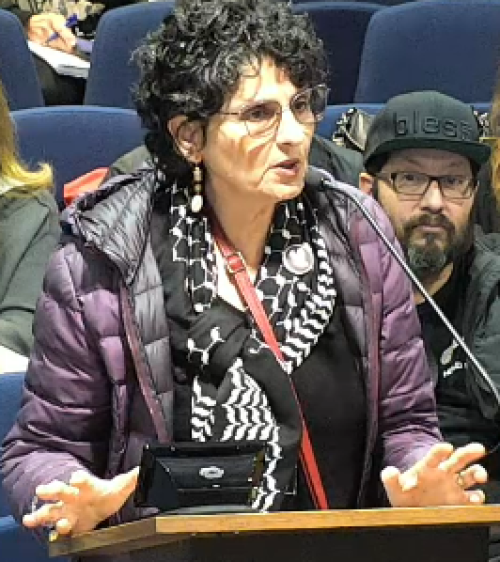
By Miriam Raftery
Photo: Doris Bittar, a Lebanese-Palestinian woman with a Jewish husband, wants a resolution that protects everyone equally without infringing on free speech rights.
March 12, 2025 (El Cajon) – El Cajon’s City Council once again waded into contentious waters at yesterday’s meeting, weighing a resolution to condemn antisemitism, with the Council majority refusing to remove a definition of antisemitism that has drawn controversy.
Mayor Bill Wells and Councilman Gary Kendrick introduced a resolution to adopt the International Holocaust Remembrance Alliance (IHRA) definition of antisemitism as an education resource for police and other city departments. The agenda report on the item notes a rise in antisemitism since the Oct. 7,2023 Hamas attack on Israel. Even before then, a 2022 FBI report found that though Jewish people are only 2 percent of the U.S. population, they were the victims of 60 percent of religious-based hate crimes.
Mayor Wells recalled learning about the Holocaust as a child and believing such “cruelty and blind bigotry” would not happen again. But recently, antisemitism has become “rampant” on college campuses, in cities, and in countries around the world, according to the mayor. “I’m asking the City Council today to help us write a resolution stating that antisemitism is wrong and should be condemned,” he said.
Councilman Gary Kendrick, coauthor of the resolution, told of his mother’s trauma from living in Czechoslovakia in 1939 and seeing close friends who were Jewish, as well as her employer, hauled away by Nazis. They were never seen again. “We need to protect Jewish refugees from discrimination,” said Kendrick, adding that he wants to add an amendment to the resolution to “formally condemn all racism against any immigrant, refugee or asylum seeker...This is supposed to be a city of love, not hate.”
Thirteen people spoke on the resolution, most voicing opposition.
Vicky Estrella noted that some international organizations have concluded that some of Israel’s retaliatory actions in Gaza constitute “genocide” such as bombings of schools and hospitals. “They have destroyed the whole country...We should be free to speak out against this kind of oppression, as we did against the holocaust,” she said, adding, “This is a ploy to silence criticism against what Israel is doing.”
Doris Bittar, a Lebanese-Palestinian woman married to a Jewish man, wants protection for people on both sides of the Israel-Palestine conflict. “Discrimination is up by 300 percent in Arab and Palestinian communities,” she told the Council. She also voiced concern about a Columbia University student whose green card was revoked by the Trump administration because he helped organize pro-Palestinian protests which the administration equates to supporting Hamas, a designated terror group. His lawyer denies any ties to Hamas. “He’s in a Louisiana prison,” Bittar noted. “What allowed that to happen? This definition (of the IHRA).” She wants any resolution to be “meaningful to all groups” and to be sure that it does not “squash our First Amendment Rights.”
Multiple speakers said they are members of Jewish Voices for Peace. They opposed the resolution, suggesting it conflates anti-Zionism, or opposition to the Israeli state, with anti-Semitism; meaning discrimination, violence or dehumanizing action toward Jews.
Summer Ismail with the Council of Islamic Relations said, “America is all about free speech,” but said in some U.S. states such as Arkansas, it’s now illegal to boycott Israel. She told the mayor, “I would like to work with you to come up with a better definition of anti-Semitism” and also “address anti-Muslim hatred.”
Liat, a who spoke in favor of the resolution but did not give her last name, however, maintained that the resolution “does not limit free speech.” She said that Jewish Voices for Peace does not represent most American Jews, citing a study that found 95 percent of American Jews consider Isarel an essential part of their Jewish identity. She noted that the IHRA definition has been “adopted by 95 percent of all Jewish organizations, 37 countries, 33 U.S. states and even the global imams’ council.”
During Council discussion, Councilmember Michelle Metschel said adopting the IHRA definition of antisemitism would bring in “a political agenda.” She asked who the bill’s sponsor, the Antisemitism Task Force of San Diego, is, since an Internet search found no reference to any so-named organization. Metschel said she opposes antisemitism, but felt this resolution would “stir up chaos.” She said she reached out to the Anti-Defamation League (ADL) and proposed tabling the resolution until after the ADL issues a report due the third week in April.
She also objected to having Council vote on adopting the IHRA’s definition without being provided the 11 points in that definition. In addition, she called for Councilmembers to “sit down with the community” to discuss the issue with members of the Jewish community, as well as with church groups and Muslim groups to “have a community that is united.”
Kendrick said, “I’m okay with tabling it....I want to be sure that there’s no limitation on free speech,” adding, “I heard some pretty good testimony today, and I would like to talk with people from all sides.”
But Mayor Wells objected. “I’d be opposed to that.” He insisted that Israel is not an apartheid state, as one speaker claimed, stating that while there are 2.1 million Arabs in Israel, Arab nations such as Saudi Arabia, Syria and Lebanon have almost none. He called Jewish Voices for Peace a “hard-core Marxist group that is a danger to America” and likened the liberal Jewish group to the Ku Klux Klan. Wells disputed Metschel’s contention that El Cajon has not had any antisemitic actions in recent years, noting that a Jewish doctor was shot and killed last year. However, authorities have not found the shooting by a disgruntled patient to be a hate crime.
Councilman Phil Ortiz said of the IHRA definition, “I don’t see anything in here that is going to stifle any kind of free speech.” He said if the resolution passes and a city employee were to post criticism regarding deaths of children in Gaza on social media, “nobody is getting fired” in the city for such actions.
Councilman Steve Goble opined, “I think you can be anti-Zionist and not antisemitic.” He said he would support any group being harassed or murdered, and indicated he would support the measure despite concerns it could “open Pandora’s box.”
Metschel said she would consider supporting the resolution if the IHRA definition was removed, which the mayor would not support.
The Council voted 4-1, with Metschel voting no, to direct the city manager to draft a revised version of the resolution, which is expected to be heard in two weeks.

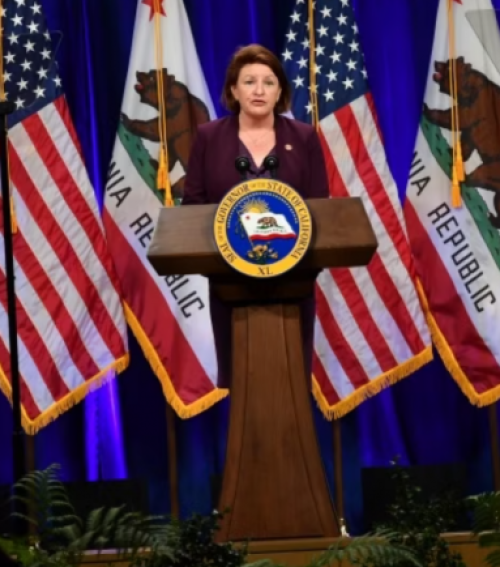

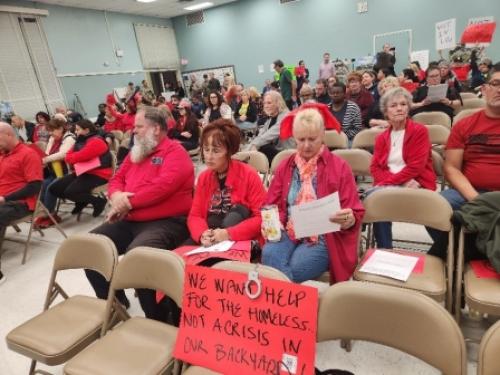
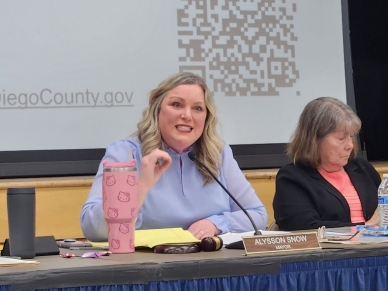 Mayor Snow (photo, right, with Councilmember Mendoza) said, “I understand that there is a population of people here in Lemon Grove who don’t want these cabins. There’s also a population of people who absolutely, desperately need these cabins... a population who really need help, and this is a big help to that.”
Mayor Snow (photo, right, with Councilmember Mendoza) said, “I understand that there is a population of people here in Lemon Grove who don’t want these cabins. There’s also a population of people who absolutely, desperately need these cabins... a population who really need help, and this is a big help to that.”  Photo, left: tiny homes in El Cajon, courtesy of Meridian Baptist Church in El Cajon
Photo, left: tiny homes in El Cajon, courtesy of Meridian Baptist Church in El Cajon Four people who have been homeless or currently are experiencing homelessness spoke in favor of the cabins, including Rachel Hayes (photo, left), who said she has been “homeless for over 10 years, including in Lemon Grove and probably in every city in San Diego... and in almost every shelter in San Diego.”
Four people who have been homeless or currently are experiencing homelessness spoke in favor of the cabins, including Rachel Hayes (photo, left), who said she has been “homeless for over 10 years, including in Lemon Grove and probably in every city in San Diego... and in almost every shelter in San Diego.” 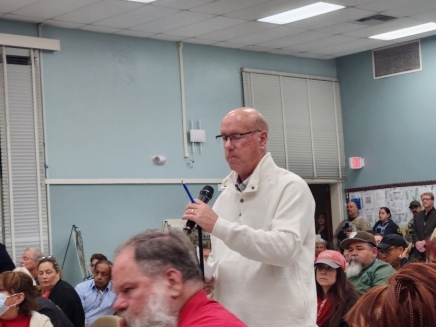 El Cajon City Councilman Steve Goble (photo, right) shared that he is proud of the success of his city’s tiny homes project, on the grounds of Meridian Baptist Church on Third Street since 2022.
El Cajon City Councilman Steve Goble (photo, right) shared that he is proud of the success of his city’s tiny homes project, on the grounds of Meridian Baptist Church on Third Street since 2022. 
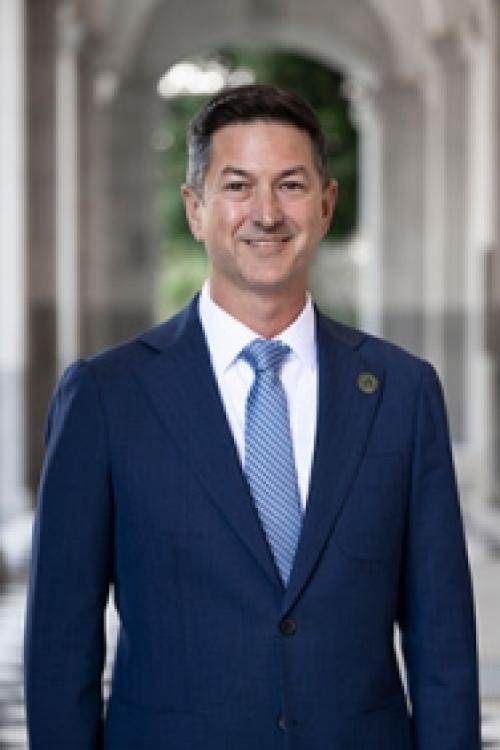


 Photos, right: screenshots of an email detailing the positions to be cut, as well as protestors at the facility
Photos, right: screenshots of an email detailing the positions to be cut, as well as protestors at the facility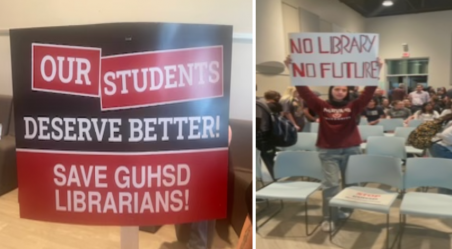 Photos, left: screenshots of posters and protesters from the beginning and ending of the meeting.
Photos, left: screenshots of posters and protesters from the beginning and ending of the meeting.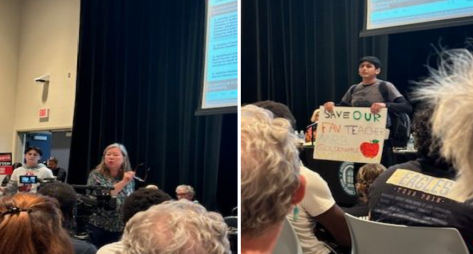 Photos, right: Rachel McCurry [left] and an unnamed student protesting the librarian cuts, who also referenced the importance of support following “two bloody shooting events” the GUHSD had two mass shootings in the past at Santana and Granite HIlls high schools.
Photos, right: Rachel McCurry [left] and an unnamed student protesting the librarian cuts, who also referenced the importance of support following “two bloody shooting events” the GUHSD had two mass shootings in the past at Santana and Granite HIlls high schools. Photos: left: the audience reacting to the Governing Board Proposal—Right: The Governing Board Chris Fite, Jim Kelly, Scott Eckert, Robert Shield and Dr. Gary Woods visible.
Photos: left: the audience reacting to the Governing Board Proposal—Right: The Governing Board Chris Fite, Jim Kelly, Scott Eckert, Robert Shield and Dr. Gary Woods visible.
 One of the documents said that the sweeping cuts to foreign aid promise to reignite outbreaks of preventable, deadly illnesses; fuel instability in war-torn areas; and put the U.S. at risk for outbreaks of infectious disease. “This will no doubt result in preventable death, destabilization, and threats to national security on a massive scale,” it says.
One of the documents said that the sweeping cuts to foreign aid promise to reignite outbreaks of preventable, deadly illnesses; fuel instability in war-torn areas; and put the U.S. at risk for outbreaks of infectious disease. “This will no doubt result in preventable death, destabilization, and threats to national security on a massive scale,” it says.